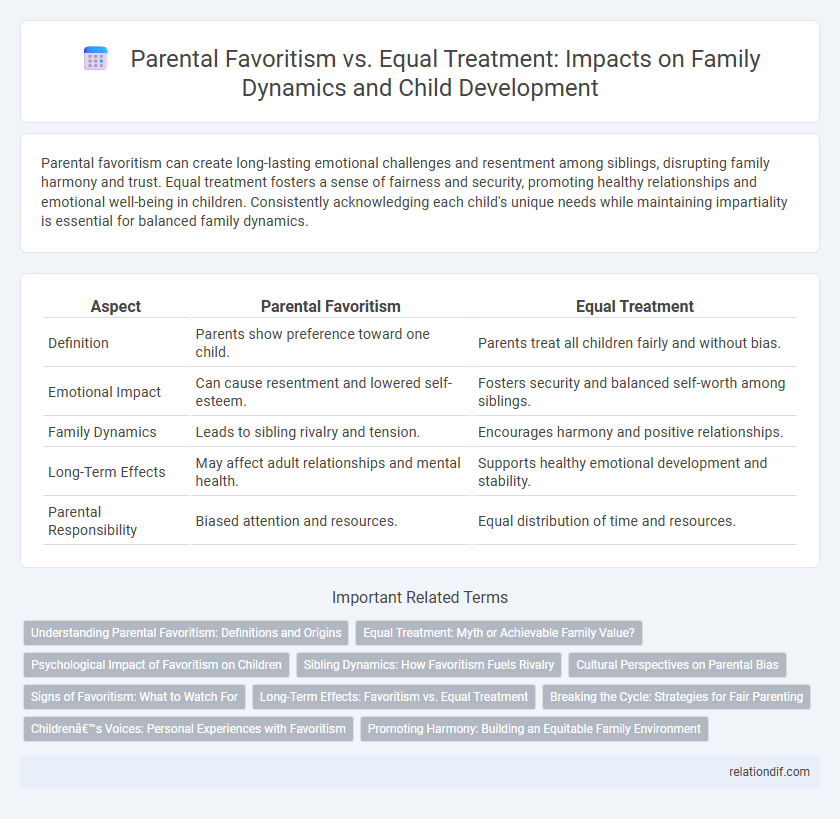Parental favoritism can create long-lasting emotional challenges and resentment among siblings, disrupting family harmony and trust. Equal treatment fosters a sense of fairness and security, promoting healthy relationships and emotional well-being in children. Consistently acknowledging each child's unique needs while maintaining impartiality is essential for balanced family dynamics.
Table of Comparison
| Aspect | Parental Favoritism | Equal Treatment |
|---|---|---|
| Definition | Parents show preference toward one child. | Parents treat all children fairly and without bias. |
| Emotional Impact | Can cause resentment and lowered self-esteem. | Fosters security and balanced self-worth among siblings. |
| Family Dynamics | Leads to sibling rivalry and tension. | Encourages harmony and positive relationships. |
| Long-Term Effects | May affect adult relationships and mental health. | Supports healthy emotional development and stability. |
| Parental Responsibility | Biased attention and resources. | Equal distribution of time and resources. |
Understanding Parental Favoritism: Definitions and Origins
Parental favoritism refers to the differential treatment of children by parents, often based on perceived personality traits, achievements, or alignment with parental values, which can significantly impact family dynamics and children's psychological development. Originating from unconscious biases, parental experiences, and cultural factors, favoritism may stem from parents' innate preferences or external pressures influencing their behavior. Understanding these definitions and origins is crucial for addressing underlying issues and promoting equitable treatment within families.
Equal Treatment: Myth or Achievable Family Value?
Equal treatment in families is often viewed as an ideal that fosters fairness, trust, and emotional security among siblings, yet it remains challenging due to individual child differences and parental biases. Research highlights that equal treatment does not mean identical behavior but rather equitable responses tailored to each child's needs, promoting healthy development and family harmony. Achieving this dynamic balance requires conscious effort, self-awareness, and consistent communication to uphold the family value of fairness without falling into the pitfalls of favoritism.
Psychological Impact of Favoritism on Children
Parental favoritism often leads to feelings of insecurity, low self-esteem, and resentment among less-favored children, significantly affecting their emotional development. Psychological studies show that perceived unequal treatment can increase anxiety, depression, and behavioral problems in children, altering sibling dynamics and long-term family relationships. Equal treatment promotes a balanced sense of self-worth and healthier emotional well-being, fostering positive sibling interactions and family cohesion.
Sibling Dynamics: How Favoritism Fuels Rivalry
Parental favoritism intensifies sibling rivalry by creating perceived inequality, leading to jealousy and competition among siblings. Unequal treatment often disrupts family harmony, fueling resentment that affects long-term sibling relationships and emotional well-being. Addressing favoritism through fair and consistent parenting is crucial to fostering positive sibling dynamics and reducing conflict.
Cultural Perspectives on Parental Bias
Cultural perspectives significantly influence parental favoritism, with some societies valuing eldest children more due to traditions and inheritance laws, while others emphasize equal treatment to promote family harmony and collective success. In collectivist cultures, parental bias often aligns with societal roles and expectations, reinforcing established family hierarchies. Conversely, individualistic cultures tend to discourage favoritism, promoting equal emotional support and opportunities to foster independence and self-esteem among all children.
Signs of Favoritism: What to Watch For
Signs of parental favoritism include consistently giving one child more attention, praise, or material rewards compared to siblings, leading to feelings of resentment or neglect. Behavioral indicators may involve one child being excused from responsibilities or discipline, while others face stricter expectations. Emotional cues include noticeable differences in parental warmth and support, which can affect sibling relationships and individual self-esteem.
Long-Term Effects: Favoritism vs. Equal Treatment
Parental favoritism often leads to long-term emotional challenges such as lowered self-esteem and sibling rivalry, impacting mental health well into adulthood. Equal treatment fosters a sense of fairness and security, promoting healthier sibling relationships and emotional resilience. Research indicates that children who perceive balanced parental attention develop stronger social skills and greater psychological well-being over time.
Breaking the Cycle: Strategies for Fair Parenting
Breaking the cycle of parental favoritism involves consistent and transparent communication, setting clear and equal expectations for all children to foster a sense of fairness. Implementing strategies such as rotating responsibilities and celebrating each child's unique achievements helps prevent feelings of neglect or bias. Prioritizing empathy and self-awareness enables parents to recognize unconscious preferences and build stronger, more balanced family relationships.
Children’s Voices: Personal Experiences with Favoritism
Children often share vivid personal experiences revealing the impact of parental favoritism on their emotional well-being and sibling relationships. Reports highlight feelings of neglect, jealousy, and lowered self-esteem when parents show clear preferences, affecting children's sense of fairness and security. Understanding these voices emphasizes the importance of equal treatment to foster healthy, supportive family dynamics and positive child development.
Promoting Harmony: Building an Equitable Family Environment
Parental favoritism disrupts family harmony by fostering resentment and undermining trust among siblings. Equal treatment emphasizes fairness and validation, promoting emotional security and mutual respect within the family unit. Building an equitable family environment involves consistent, unbiased parenting strategies that nurture strong, harmonious relationships.
parental favoritism vs equal treatment Infographic

 relationdif.com
relationdif.com